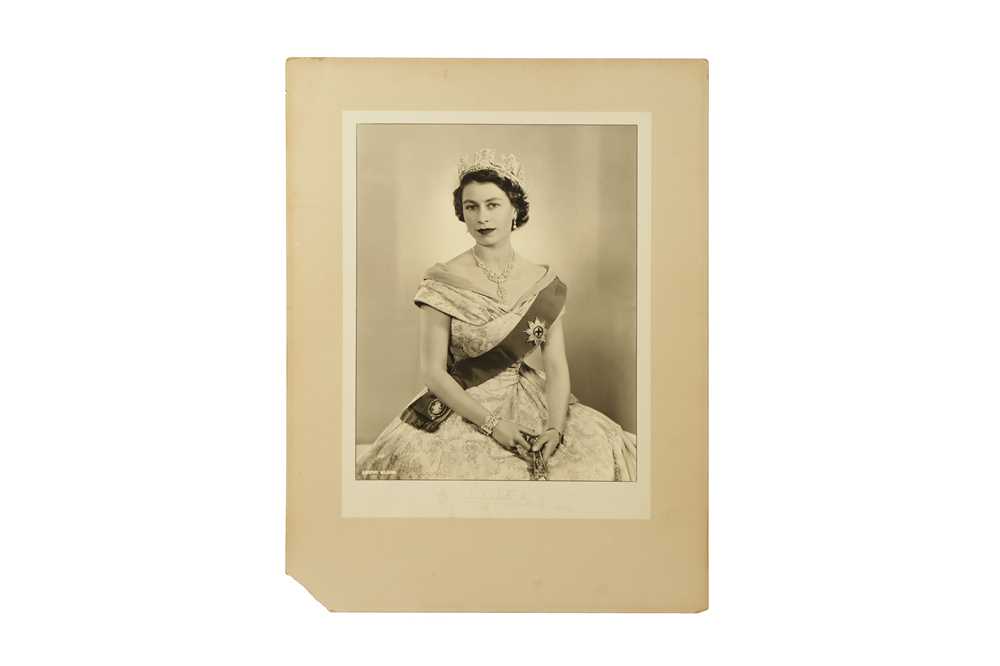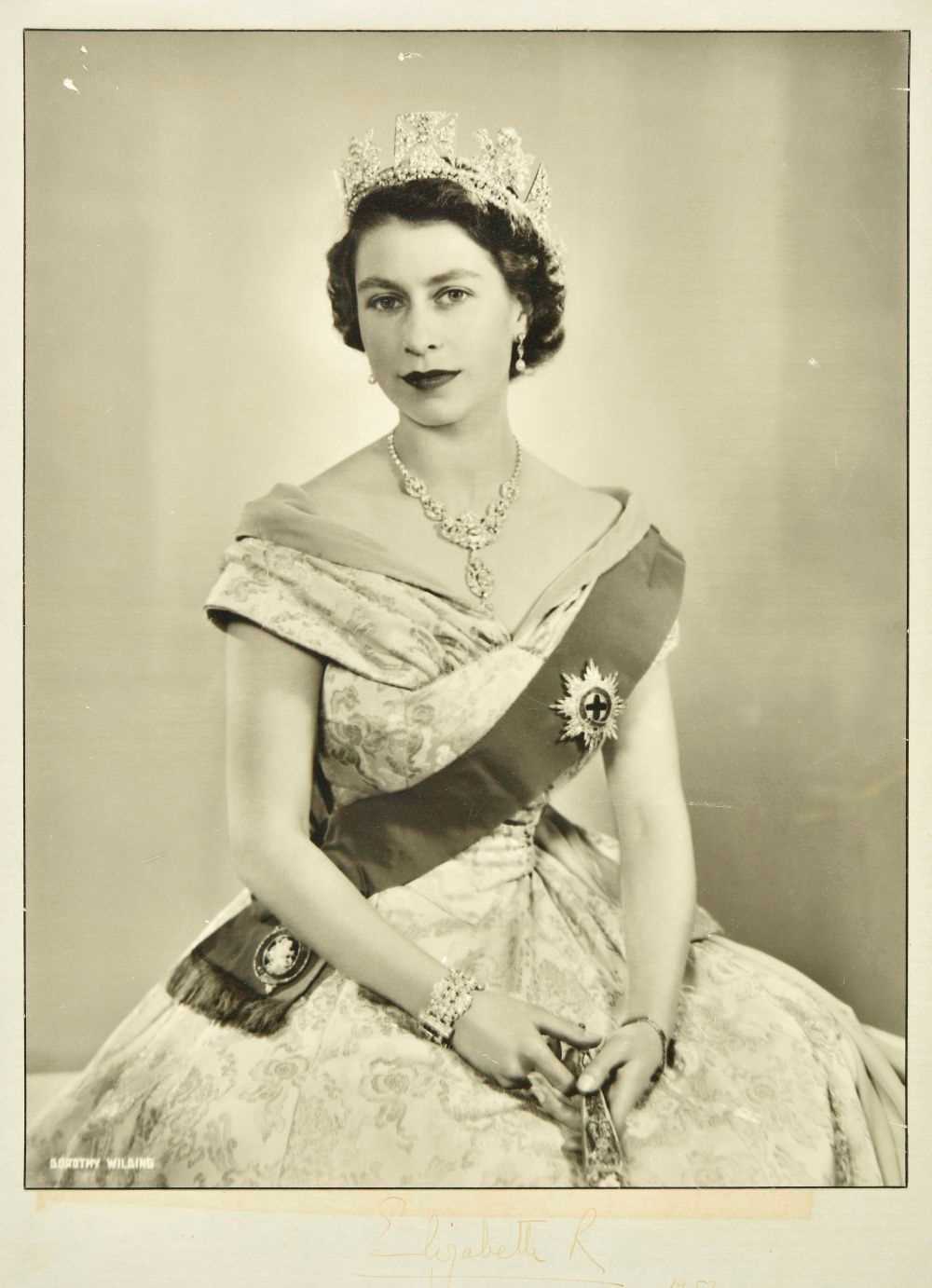ELIZABETH I, Queen of England (1558-1603)]. PRIVY COUNCIL LETTER to Sir Nicholas Throckmorton, the English Ambassador at Paris, n.p. [Westminster], 5 May 1561, in Latin , conveying the reply given by the Queen in Council to the Spanish Ambassador, refusing his request that the Papal Nuncio, the Abbot of Martinengo, be permitted to visit England to persuade the Queen to allow English representatives to attend the Council of Trent, signed on the 2nd page by fifteen members of the Privy Council, 2 pages, folio (300 x 210mm) , written in a neat italic hand, integral blank leaf endorsed on verso to Sir Nicholas Throckmorton, tipped on guard, in an album, red half morocco. The signatures on the 2nd page include Sir Nicholas Bacon (Lord Keeper), William Paulet (Marquis of Winchester, Lord High Treasurer), William Parr (Marquis of Northampton), Henry Fitzalan (Earl of Arundel), Francis Russell (Earl of Bedford), William Herbert (Earl of Pembroke), Edward, Lord Clinton (Lord High Admiral), William Howard (Baron Howard of Effingham, Lord Chamberlain), Sir Edward Rogers (Comptroller of the Queen's Household), Sir Francis Knollys (Treasurer of the Queen's Household), William Cecil (Lord Burghley, Minister of State), Sir Ambrose Cove (Chancellor of the Duchy of Lancaster), Sir William Petre (Secretary of State), Sir John Mason (Privy Councillor), Nicholas Wotton (Dean of Canterbury and York). This important letter was written before Elizabeth had been excommunicated. The Council of Trent, which was in intermittent session from 1545-1563 was of the greatest significance for the Roman Catholic Church in settling theological and doctrinal matters, questions of ecclesiastical law and the regulations of ecclesiastical life. Ten years had passed since the previous session, and the prospect of the Papal Nuncio's arrival for discussions would have revived the hopes of the English Catholics. The stern refusal to allow the nuncio to visit any part of the Kingdom is followed by an explanation of the numerous and weighty reasons for it - both because it would be against the laws of the realm and because the time and other circumstances persuade the Queen of its undesirability. 'Causae et rationes quae hoc suadent multae sunt et graves, tum quia leges huius regni veritati et rationi intentes hoc plane prohibent, tum quia temporis aliarumque circumstantiorum habita et perpensa ratione, indicatur fore contra politiam ac communem tranquillitatem Regni'. But Elizabeth expresses her willingness, in principle, to take part in a general Christian Council and if it fulfils the terms of a free and general Council to send representatives of the Anglican church. 'Nam si ita possit liquido apparere decretum est & certo constitum apud suam Ma[iesta] . . . ex proprio suo et mere motu fore ut pro regnis suis committantur legati ac oratores pii, docti et in Ecclesia Anglicana authoritate et officio insignis'.
ELIZABETH I, Queen of England (1558-1603)]. PRIVY COUNCIL LETTER to Sir Nicholas Throckmorton, the English Ambassador at Paris, n.p. [Westminster], 5 May 1561, in Latin , conveying the reply given by the Queen in Council to the Spanish Ambassador, refusing his request that the Papal Nuncio, the Abbot of Martinengo, be permitted to visit England to persuade the Queen to allow English representatives to attend the Council of Trent, signed on the 2nd page by fifteen members of the Privy Council, 2 pages, folio (300 x 210mm) , written in a neat italic hand, integral blank leaf endorsed on verso to Sir Nicholas Throckmorton, tipped on guard, in an album, red half morocco. The signatures on the 2nd page include Sir Nicholas Bacon (Lord Keeper), William Paulet (Marquis of Winchester, Lord High Treasurer), William Parr (Marquis of Northampton), Henry Fitzalan (Earl of Arundel), Francis Russell (Earl of Bedford), William Herbert (Earl of Pembroke), Edward, Lord Clinton (Lord High Admiral), William Howard (Baron Howard of Effingham, Lord Chamberlain), Sir Edward Rogers (Comptroller of the Queen's Household), Sir Francis Knollys (Treasurer of the Queen's Household), William Cecil (Lord Burghley, Minister of State), Sir Ambrose Cove (Chancellor of the Duchy of Lancaster), Sir William Petre (Secretary of State), Sir John Mason (Privy Councillor), Nicholas Wotton (Dean of Canterbury and York). This important letter was written before Elizabeth had been excommunicated. The Council of Trent, which was in intermittent session from 1545-1563 was of the greatest significance for the Roman Catholic Church in settling theological and doctrinal matters, questions of ecclesiastical law and the regulations of ecclesiastical life. Ten years had passed since the previous session, and the prospect of the Papal Nuncio's arrival for discussions would have revived the hopes of the English Catholics. The stern refusal to allow the nuncio to visit any part of the Kingdom is followed by an explanation of the numerous and weighty reasons for it - both because it would be against the laws of the realm and because the time and other circumstances persuade the Queen of its undesirability. 'Causae et rationes quae hoc suadent multae sunt et graves, tum quia leges huius regni veritati et rationi intentes hoc plane prohibent, tum quia temporis aliarumque circumstantiorum habita et perpensa ratione, indicatur fore contra politiam ac communem tranquillitatem Regni'. But Elizabeth expresses her willingness, in principle, to take part in a general Christian Council and if it fulfils the terms of a free and general Council to send representatives of the Anglican church. 'Nam si ita possit liquido apparere decretum est & certo constitum apud suam Ma[iesta] . . . ex proprio suo et mere motu fore ut pro regnis suis committantur legati ac oratores pii, docti et in Ecclesia Anglicana authoritate et officio insignis'.















Testen Sie LotSearch und seine Premium-Features 7 Tage - ohne Kosten!
Lassen Sie sich automatisch über neue Objekte in kommenden Auktionen benachrichtigen.
Suchauftrag anlegen